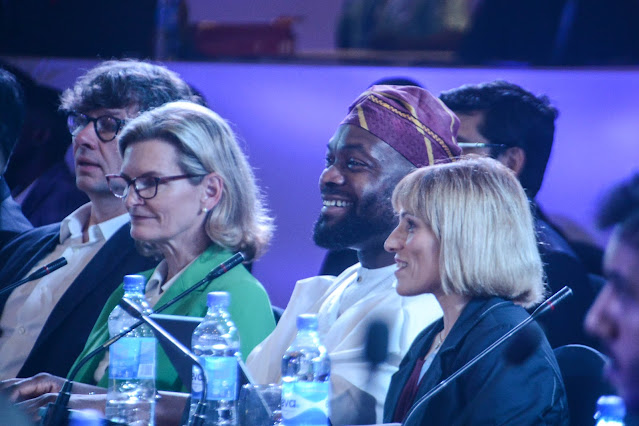 |
| Minister of Communications, Innovation, and Digital Economy, Dr. Bosun Tijani (in cap) with other ITU officials |
In a significant move to enhance global digital connectivity, Nigeria recently hosted the inaugural International Submarine Cable Resilience Summit in Abuja.
The event, organized by Nigeria’s Ministry of Communications, Innovation, and Digital Economy, in partnership with the International Telecommunication Union (ITU) and the International Cable Protection Committee (ICPC), brought together over 250 stakeholders from 50 countries.
Globacom, a leading digital solutions provider, joined forces with the Ministry to support this initiative, emphasizing the importance of submarine cable resilience for a robust digital economy. The summit aimed to foster global cooperation and innovation to protect the critical infrastructure that carries over 99% of international data traffic.
Globacom, which owns the Glo 1 submarine cable wholly, joined other global stakeholders in the telecommunications and digital landscape in the discussions aimed at bolstering the resilience of cable networks for the benefit of consumers.
Having realized the importance of submarine cables quite early, Globacom deployed Glo 1 from Europe to Africa in 2010. In 2024 when fibre cuts impacted economic, governmental and private activities across West Africa, Glo 1 saved the day for many customers.
The cable system was up and running due to its resilience and the constant maintenance strategies deployed by the company. Its capacity was recently upgraded to serve more and more customers and ensure reliable connectivity at all times, a press release from the company, explains.
Declaring the two-day summit open, the Minister of Communications, Innovation, and Digital Economy, Dr. Bosun Tijani, highlighted the significant role submarine cables play in enhancing smooth operation of modern economies.
"Submarine cables form the backbone of global digital connectivity, carrying over 95% of international data traffic, linking continents, and enabling the smooth operation of modern economies. Yet, despite their significance, these infrastructures remain vulnerable to disruptions - whether from natural disasters, geopolitical tensions, accidental damage, or evolving cyber threats,” he stated.
In the light of this, the Minister emphasized the various commitments Nigeria has made under the leadership of President Bola Ahmed Tinubu to strengthen its digital infrastructure and advance policies that support connectivity, innovation, and economic growth.
"We have taken decisive steps as a nation to recognize and protect telecommunications infrastructure as Critical National Infrastructure, aligning with our broader efforts to enhance digital resilience across sectors,” he noted.
In her address, the Secretary-General of the International Telecommunication Union (ITU), Doreen Bogdan-Martin, emphasized the symbolism of the global undersea network in the realm of innovation and the investment necessary to connect the world meaningfully, highlighting the extent of human reliance on digital infrastructure.
 |
| Other participants |
Also speaking, Prof. Sandra Maximiano, Co-Chair, Advisory Board of ITU, addressed the challenges and the need to preventing cable cuts from occurring, emphasizing the importance of bolstering resilience by guaranteeing the availability of technical resources, such as vessels, stockpiles, and spare parts, in areas with lower submarine cable density.
Additionally, he underscored the need to align regulatory measures with the demands of resilience.
The event also featured several panel sessions dedicated to the critical dimensions of submarine cable resilience.





0 comments:
Post a Comment